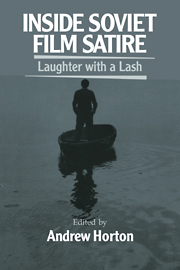Book contents
- Frontmatter
- Contents
- Foreword: If life itself is a satire …
- Acknowledgments
- Editor's note
- Introduction: Carnival versus lashing laughter in Soviet cinema
- Part One The long view: Soviet satire in context
- Part Two Middle-distance shots: The individual satire considered
- VI A subtextual reading of Kuleshov's satire The Extraordinary Adventures of Mr. West in the Land of the Bolsheviks (1924)
- VII The strange case of the making of Volga, Volga
- VIII Circus of 1936: Ideology and entertainment under the big top
- IX Black humor in Soviet cinema
- X Laughter beyond the mirror: Humor and satire in the cinema of Andrei Tarkovsky
- XI The films of Eldar Shengelaya: From subtle humor to biting satire
- Part Three Close-ups: Glasnost and Soviet satire
- Filmography
- Contributors
- Index
XI - The films of Eldar Shengelaya: From subtle humor to biting satire
Published online by Cambridge University Press: 07 October 2009
- Frontmatter
- Contents
- Foreword: If life itself is a satire …
- Acknowledgments
- Editor's note
- Introduction: Carnival versus lashing laughter in Soviet cinema
- Part One The long view: Soviet satire in context
- Part Two Middle-distance shots: The individual satire considered
- VI A subtextual reading of Kuleshov's satire The Extraordinary Adventures of Mr. West in the Land of the Bolsheviks (1924)
- VII The strange case of the making of Volga, Volga
- VIII Circus of 1936: Ideology and entertainment under the big top
- IX Black humor in Soviet cinema
- X Laughter beyond the mirror: Humor and satire in the cinema of Andrei Tarkovsky
- XI The films of Eldar Shengelaya: From subtle humor to biting satire
- Part Three Close-ups: Glasnost and Soviet satire
- Filmography
- Contributors
- Index
Summary
A recognized master of Soviet Georgian cinematic comedy, Eldar Shengelaya is best known in the USSR for the mixture of humor and sadness, fantasy and reality, that characterizes his most famous films, An Unusual Exhibition (1968) and Screwballs (1973). Blue Mountains (1983), Shengelaya's lastest film, departs from his earlier work, bombarding the viewer with cutting satire and an uncompromising, driving impatience typical of the late stagnation period (the administrations of Brezhnev and Chernenko). The present paper looks at the comedies and satires of Eldar Shengelaya as an increasingly reflective and self-contained ouvre, less and less concerned with the multinational Soviet State and more and more concerned with the Georgian national self. Like Georgian cinema in general, Shengelaya's films reveal a never-ending struggle for national revival that ranges from light comedy filled with subtle political innuendo in times of oppression to sharp, self-critical satire in times of openness and hope for independence and self-definition.
An Unusual Exhibition: The early thaw
Shengelaya's first feature-length comedy, An Unusual Exhibition (1968), reveals the director's debt to classic Georgian comedy of the 1930s and his original vision. Described as “a mixture of conventional realism and poetic paradox, drama and comedy, the grotesque and the lyrical,” An Unusual Exhibition is often labeled “tragi-farce,” in which “funny moments are contrasted with unhappiness, and poetry is born at the meeting point of farce and tragedy.”
- Type
- Chapter
- Information
- Inside Soviet Film Satire , pp. 105 - 114Publisher: Cambridge University PressPrint publication year: 1993



